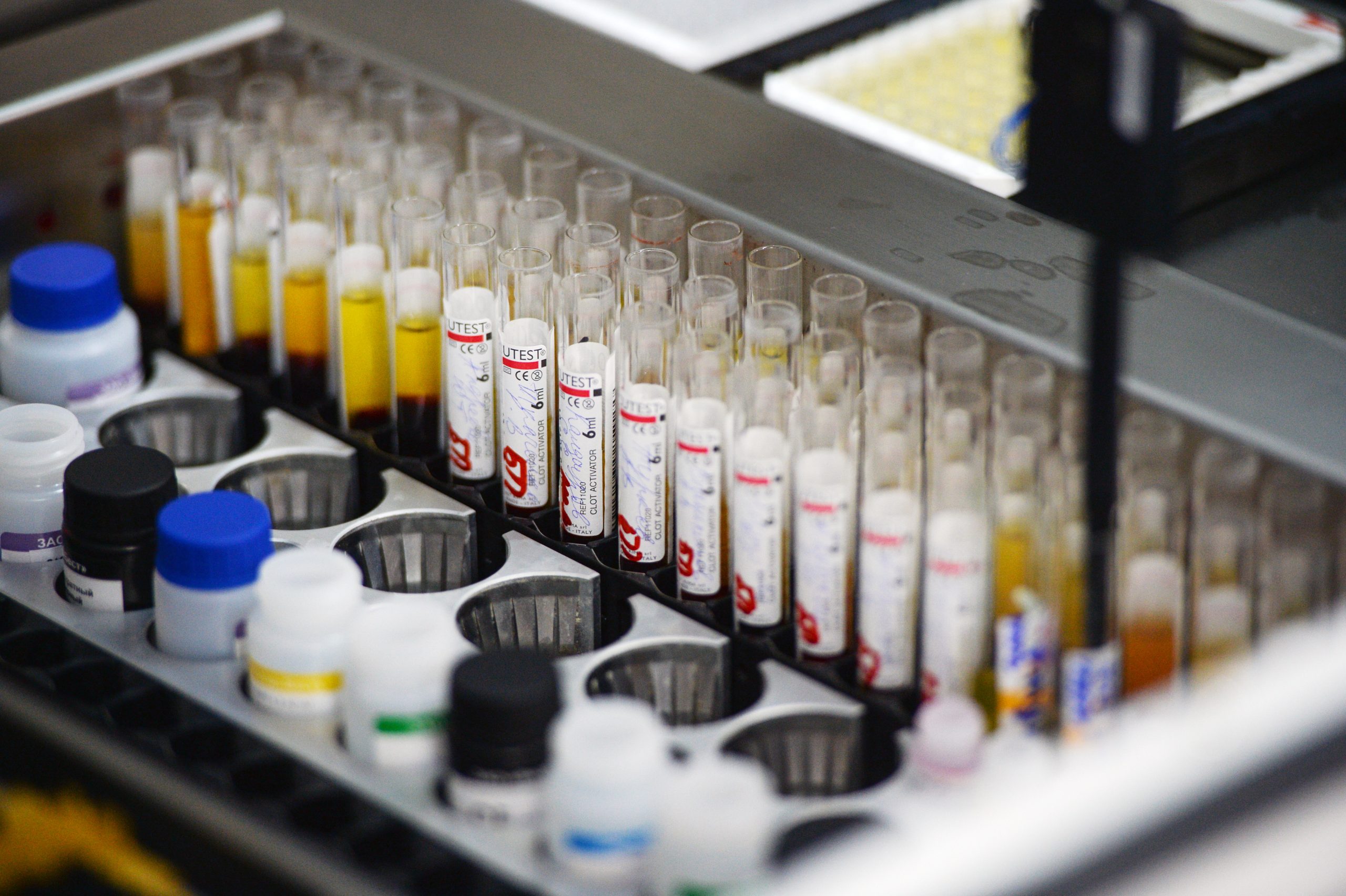Mississippi Today
Mississippi battles 900% increase in babies born with syphilis

Mississippi battles 900% increase in babies born with syphilis
Mississippi is leading the country in syphilis cases, resulting in a tragic uptick of newborns risking death from the disease across the state.
Mississippi has had a more than 900% increase in babies born with syphilis – a sexually transmitted disease that is also passed to an infant during pregnancy – in six years ending in 2021. Syphilis can cause miscarriages and death. Surviving children born with the disease can have major malformations and life-long complications.
The Centers for Disease Control and Prevention reported preliminary data that 2,677 babies nationwide born with congenital syphilis in 2021. It was the highest number reported in one year since 1994. Case counts have been rising steadily since 2013.
“It's absolutely alarming and shocking,” said former State Health Officer Dr. Thomas Dobbs, “and it's totally preventable.”
Dobbs now leads the University of Mississippi Medical Center's School of Population Health. He and other leading health care officials in the state are trying to warn parents and colleagues about the growing problem.
“Years past, it was a rare and uncommon event (at Forrest General Hospital), where we had a couple babies per year with congenital syphilis,” said Dr. Anita Henderson, a pediatrician at The Pediatric Clinic in Hattiesburg. “Now, we are seeing babies on a monthly, sometimes weekly basis, who test positive from mothers who received partial treatment, or no treatment.”
Syphilis is treated effectively with penicillin. Despite a simple cure, Mississippians are continuing to contract and pass along the illness with dire consequences.
In 2016, eight babies in Mississippi were born and hospitalized with syphilis. In 2021, that number hit 106, according to data Dobbs shared based on health department and hospital discharge numbers. While syphilis cases in infants have gone up nationwide, Mississippi's rate of increase is nearly five times the national average.
“The numbers are bad,” said Dr. Charlotte Hobbs, a professor of pediatric infectious disease and microbiology at UMMC, “and they're just going to get worse.”
Mississippi is tied with Nevada for the leading rate of overall cases of syphilis per population of 100,000.
Most states require syphilis screenings in pregnancy by law, but Mississippi is one of six that doesn't. Without mandatory screenings, some mothers are shocked to learn they even have the disease. They may not have symptoms, and by the time they do find out, it's sometimes too late.
State Epidemiologist Paul Byers recently told NBC the Department of Health is exploring the possibility of a testing mandate through its regulatory authority.
“The messaging isn't always clear,” Hobbs said, “but syphilis can kill your baby and it can kill you.”
Henderson said it largely comes down to a lack of sexually transmitted disease education. Sometimes those who have syphilis don't realize a single dose of treatment isn't enough to eradicate the infection and they need multiple doses. Maybe they were treated, but their partner never was, and they got reinfected.
“I do think they are surprised to learn syphilis can cause problems with the baby,” Henderson said. “Syphilis is easily treated … so it is not something people think about a cause of death in children in 2023. But we have had several babies die and many other suffering long term issues.”
Dobbs said poorer women – usually women of color – especially struggle to access prenatal health care. Nearly 71% of the babies born and hospitalized with syphilis in Mississippi in 2021 were Black, according to data provided by Dobbs. It's another example of the state's alarming health care disparities in treatment of the Black population in Mississippi.
Transportation is a major barrier. OB-GYN offices can be a long haul from rural portions of the state, and county health clinics are dealing with major nursing and staff shortages. County health clinics may offer free syphilis screenings, but nine locations have closed in recent years, and more have reduced their hours.
“We don't have a comprehensive support network where women are accessing prenatal care,” Dobbs said.
He sees that as the largest barrier. Another comes with how difficult it is for expecting mothers and parents to access health care in general, especially under Medicaid. That's why doctors across Mississippi are pushing for the state's Medicaid coverage to include presumption of eligibility during pregnancies. A bill in the House that would have sped up access to care for mothers at lower income thresholds during pregnancy already died this session.
It's not uncommon for an expecting mother to wait more than a month before their public health insurance is approved after they become aware of their pregnancy. That public health insurance covers about 65% of the state's pregnancies.
Doctors offices often won't see pregnant patients until they have their coverage card in hand – which could mean missing out on penicillin treatments in the first trimester, when outcomes would be the most favorable.
Penicillin treatments, though relatively simple, are pricey. Doctors' offices often don't want to take on that expense without the assurance they will be paid back.
“Women of a reproductive age need to have regular health care to have proper family resources,” Dobb said. “Women should be empowered to time births consistent with their desires, with the counseling of physicians.”
But in Mississippi that access often isn't easy to come by. Dobbs said the syphilis outbreak is a reflection on the depletion of Department of Health resources.
“If your health department doesn't have anybody in them, you can't get tested or treated,” Dobbs said. “Those are the bread-and-butter pieces of syphilis control. Over the past two decades, public health has deteriorated remarkably.”
Now, an increasing number of children in Mississippi are living with the consequences.
This article first appeared on Mississippi Today and is republished here under a Creative Commons license.
Mississippi Today
On this day in 1950


MAY 16, 1950

Twenty Black families from South Carolina filed the lawsuit, Briggs v. Elliott, the first direct attack on the validity of the “separate but equal” doctrine in public schools.
The litigation was later combined with the successful Brown v. Board of Education case. The litigation might never have happened if not for the Rev. Joseph A. DeLaine, who accepted the NAACP's call to challenge the school bus transportation practices in Clarendon County, where Black students had to walk up to 8 miles to school.
“I realize that the stand that I take may cost me my job as a school teacher, but we need men,” he wrote.
Property owner Levi Pearson had previously sued, asking that school buses be provided for Black students. After his lawsuit failed on technical grounds, Thurgood Marshall approached DeLaine, saying he needed families for litigation, or the NAACP couldn't go any further.
After gathering the signatures of 107 parents and their children, economic pressure and violence followed. Despite this, 17 adults signed the petition again, and the lawsuit moved forward to trial. Evidence showed that South Carolina spent $221 annually for each white student, but only $45 for each Black student. White children had modern schools with a teacher for every grade. Meanwhile, Black children studied in wooden shacks, reading textbooks discarded by white students.
As a result of their activism, the Pearson family saw boycotts of their timber, and the Briggses were fired from their jobs. So were DeLaine and his wife. They saw their home and church burned to the ground. They were forced to leave the state after a drive-by shooting. In 2003, the families of DeLaine, Levi Pearson and the Briggses received Congressional Gold Medals for their courage.
This article first appeared on Mississippi Today and is republished here under a Creative Commons license.
Did you miss our previous article…
https://www.biloxinewsevents.com/?p=358956
Mississippi Today
PSC axes solar programs in light of EPA funds, advocates file lawsuit
Advocates from some of the state's conservation groups — such as Audubon Delta, Mississippi Sierra Club and Steps Coalition — spoke out Wednesday against a recent decision by the Mississippi Public Service Commission to suspend several solar programs, including “Solar for Schools,” less than two years after the previous commission put them in place.
“This is particularly disappointing because the need for these incentives in the state of Mississippi is significant,” said Jonathan Green, executive director of Steps Coalition. “Energy costs in the South, and in particular the region known as the Black Belt, are higher than those in other parts of the country for a number of reasons. These regions tend to have older energy generation infrastructure, and housing that has not been weatherproofed to modern standards. For many low- to moderate-income residents in the state of Mississippi, energy burden and energy insecurity represent real daily economic challenges.”
The PSC voted 2-1 at its April docket meeting to do away with the programs, reasoning in part that new funds through the Inflation Reduction Act would be available to the state. About 10 days later, the Environmental Protection Agency awarded $62 million to the state, through the Hope Enterprise Corporation, to help low-income Mississippians afford adding solar power to their homes. The funds are part of the Biden Administration's Solar for All program, one of the several recent federal initiatives aimed at reducing greenhouse gas emissions.
The PSC decision ended three programs the previous commission put in place to encourage wider adoption of solar power through the two power companies it regulates, Entergy Mississippi and Mississippi Power: “Solar for Schools,” which allowed school districts to essentially build solar panels for free in exchange for tax credits, as well as incentives for low-income customers and battery storage.
Last Friday, the Sierra Club filed lawsuits in chancery courts in Hinds and Harrison counties against the commission, arguing the PSC broke state law by not providing sufficient reasoning or public notice before making the changes. Advocates also argued that new funding going to Hope Enterprise won't go as far without the PSC's low-income incentives.
The programs were part of a 2022 addition to the state's net metering rule, a system that allows homeowners to generate their own solar power and earn credits for excess energy on their electric bills. Mississippi's version is less beneficial to participants than net metering in most states, though, because it doesn't reimburse users at the full retail cost. Mississippi's net metering program itself is still in tact.
Northern District Commissioner Chris Brown said that, while he supported efforts to expand solar power, he didn't think programs that offer incentives from energy companies were fair to other ratepayers.

“It's the subsidy that we take issue with,” Brown said at the meeting. “It's not the solar, it's not the helping the schools. We just don't think it's good policy to spread that to the rest of the ratepayers.”
Brown and Southern District Commissioner Wayne Carr voted to end the programs, while Central District Commissioner De'Keither Stamps voted against the motion. All three are in their first terms on the PSC. Brown's position is in line with what the power companies as well as Gov. Tate Reeves have argued, which is that programs like net metering forces non-participants to subsidize those who participate.
Robert Wiygul, an attorney for the Mississippi Sierra Club, countered that argument during Wednesday's press conference, saying that net metering actually helps non-participants by adding more power to the grid and reducing the strain on the power companies' other infrastructure. Moreover, he said, the PSC hasn't offered actual numbers showing that non-participants are subsidizing the program.
“Look, if the commission wants to talk about that, we are ready to talk about it,” Wiygul said. “But what we got here is a situation where these two commissioners just decided they were going to do this. We don't even know what that claim is really based on because it hasn't been through the public notice and hasn't been through the public comment process.”
While no schools had officially enrolled in “Solar for Schools,” which went into effect in January of last year, Stamps told Mississippi Today that there were places in his district getting ready to participate in the very programs the PSC voted to suspend.

“My issue was we should have talked to the entities that were going through the process to (understand what they were doing) to participate in the programs before you eliminate the programs,” he said.
Several school districts in the state are already using solar panels thanks to funding from a past settlement with Mississippi Power. Officials there told Mississippi Today that the extra power generated from the panels has freed up spending for other educational needs. During the public comment period for the 2022 net metering update, about a dozen school district superintendents from around the state wrote in to support the initiative. Ninety-five school districts in the state would have been eligible for the program because they receive power from Entergy Mississippi or Mississippi Power.
Former commissioner Brent Bailey, who lost a close reelection bid in November to Stamps, was an advocate for the schools program that the PSC created while he was there. At the April docket meeting, he pleaded with the new commission to reconsider, arguing that the new federal funding won't have the same impact without those programs.
“My ask is to at least give this program a chance, see where it goes, and hear from stakeholders that have participated,” Bailey said. The solar programs, he added, weren't just about expanding renewable energy, but taking advantage of a growing economy around solar power as well: “We can just stand by and watch it go by, or we can participate in this and bring economic development to the state.”
This article first appeared on Mississippi Today and is republished here under a Creative Commons license.
Crooked Letter Sports Podcast
Podcast: In or out (of the NCAA Tournament)?

College baseball's regular season is in its last week, which means baseball bracketology is a popular activity. State needs to finish strong to become a Regional host. Southern Miss probably has already punched its ticket as a 2- or 3-seed. Ole Miss, playing its best baseball presently, needs victories, period. Meanwhile, the State High School softball tournament is this week in Hattiesburg, and the state baseball tournament comes to Trustmark Park in Pearl next week.
Stream all episodes here.
This article first appeared on Mississippi Today and is republished here under a Creative Commons license.
Did you miss our previous article…
https://www.biloxinewsevents.com/?p=358148
-
SuperTalk FM3 days ago
Martin Lawrence making 3 stops in Mississippi on comedy tour
-
Our Mississippi Home2 days ago
Beat the Heat with Mississippi’s Best Waterparks
-
Mississippi Today6 days ago
Lawmakers may have to return to Capitol May 14 to override Gov. Tate Reeves’ potential vetoes
-
Mississippi News7 days ago
Man arrested for allegedly breaking into home, robbing owner
-
SuperTalk FM7 days ago
Couple arrested after husband received unemployment benefits while in prison
-
Mississippi News Video5 days ago
Local dentists offer free dental care in Amory
-
Our Mississippi Home3 days ago
Charlie’s U-Pik: Opening Soon for the Summer Season
-
Mississippi News6 days ago
Bond set for West Point couple accused of killing their child








































